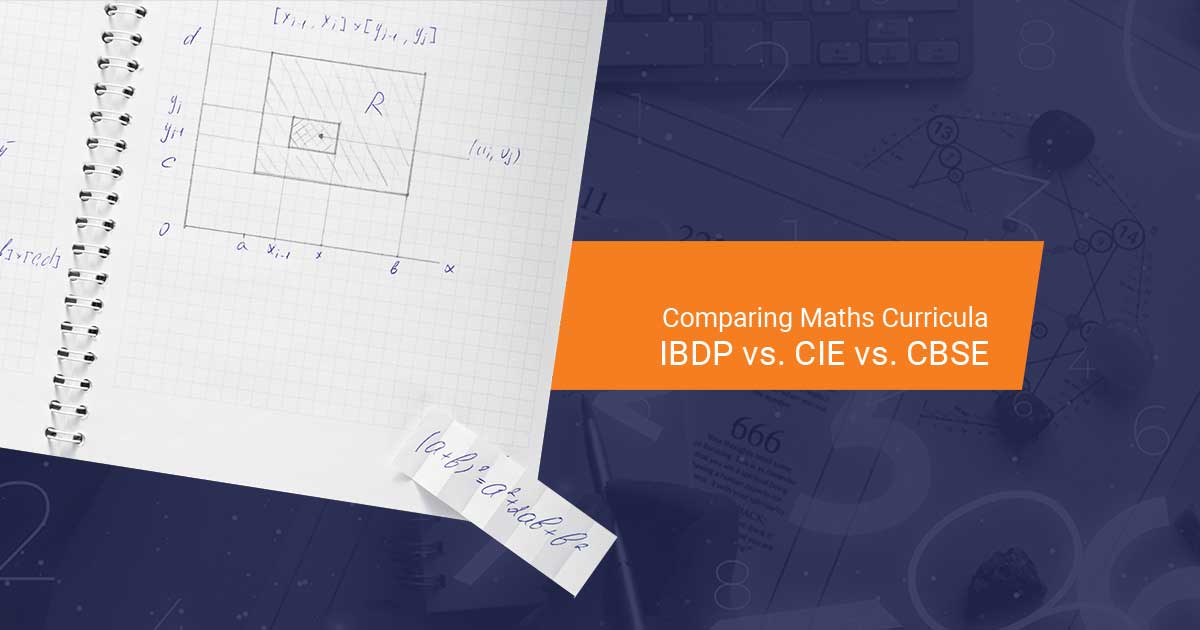

Mathematics enables students to dissect complex problems, break them into manageable parts, and develop effective solutions. Furthermore, in an increasingly digital era, mathematics plays a vital role in areas such as computer algorithms, software development, data analysis, and artificial intelligence.
The International Baccalaureate Diploma Programme (IBDP), Cambridge International Examinations (CIE), and the Central Board of Secondary Education (CBSE) offer diverse and comprehensive mathematics curricula tailored to the unique educational needs of students at various stages of their academic journey. Today, we shall explore the distinctive features and key components of the mathematics curricula in the IBDP, CIE, and CBSE in India.
Maths Curriculum in IBDP
Mathematics plays a vital role within the IBDP, covering an extensive syllabus of mathematical principles and their practical application in the real world. The IBDP Mathematics programme is divided into two primary streams: Analysis and Approaches (AA) and Applications and Interpretation (AI). The AA curriculum is focused on nurturing analytical and problem-solving abilities, whereas the AI curriculum emphasises the pragmatic utilisation of mathematical methods. We have summarised the two types of subject combinations included in an IB Maths curriculum:
IB Maths Analysis and Approaches (AA)
IB Math AA is renowned for its focus on abstract and analytical mathematical principles. This syllabus is available in both higher level (HL) and standard level (SL) and is divided into six sections, such as:
IB Maths Applications and Interpretation (AI)
IB Maths AI is also available in HL and SL and emphasises the practical utilisation of mathematical principles in real-life situations. The curriculum equips students with practical mathematical skills for data analysis, mathematical modelling, and problem-solving, such as:
Maths Curriculum in CIE
The CIE Maths curriculum fosters the development of essential mathematical skills, serving as a solid foundation for further study of math or the enhancement of skills in other disciplines. The curriculum is designed to enhance the learners' competence, self-assurance, and proficiency in employing mathematical techniques, both with and without calculators. CIE Math also cultivates learners' intuition for quantity, patterns, and relationships, promoting their abilities in reasoning and analysis. The curriculum emphasises developing skills such as problem-solving, both within mathematical contexts and in real-life situations. Following are the key topics that are covered in the CIE Math curriculum:
Maths Curriculum in CBSE
The CBSE Math curriculum is designed to provide a comprehensive understanding of mathematics principles and theories for students from primary to secondary levels. Here is an overview of the CBSE mathematics curriculum at various levels:
Final Thoughts
The mathematics curricula in the IBDP, CIE, and CBSE offer unique pathways for students to develop knowledge and skills related to mathematical principles and applications. The IBDP's AA and AI, CIE's, and CBSE’s math curricula are tailored to enable students to develop mathematical competencies for both academic excellence and real-world problem-solving. Though the choice of the curriculum depends on the educational system students are part of, each curriculum contributes significantly to the development of mathematical proficiency and critical thinking skills.
Recent Blogs
IGCSE Full Form
What is the International Baccalaureate?
IBDP Full Form
CIE Board Full Form
CBSE Full Form
Site Designed and Maintained By : Office of Communications, JAIN Group All rights reserved.